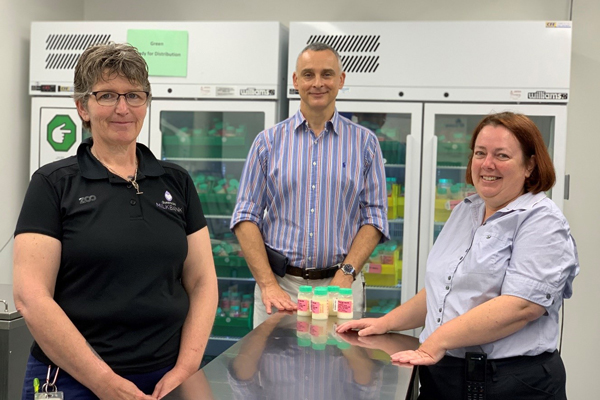Queensland Milk Bank reaches 1000 donors

The Queensland Milk Bank team – Milk Bank Technician Lisa Fletcher, Director of Neonatology Dr Pieter Koorts and Clinical Nurse Consultant Karen Langford.
Royal Brisbane and Women’s Hospital’s Queensland Milk Bank celebrates a big milestone this month after accepting their 1000th donor of life-enhancing breastmilk.
Queensland Milk Bank receives donations of breastmilk from mothers with a surplus supply to support the medical and nutritional needs of preterm and unwell babies across Australia. Since opening in 2012, the service has pasteurised and safely distributed over 8,000 litres of clinically safe breastmilk.
Royal Brisbane and Women’s Hospital Director of Neonatology and driving force behind the Queensland Milk Bank Dr Pieter Koorts is proud of the impact the Milk Bank has made to families across Australia. With the knowledge that just one litre of breastmilk can meet the needs of over 50 seriously ill babies, Pieter and his team have enabled countless babies to grow healthy and strong.
“We have achieved a lot since opening in 2012. In our early days, we accepted as many donations as we had the capacity to pasteurise and store in our fridges. We did the best we could working from a small space but with limited resources, we could only support babies in hospital at RBWH and nearby surrounding hospitals,” said Dr Koorts.
“Eight years on, our service and reach has certainly expanded. We’ve upgraded to a bigger space and advanced our pasteurising processes and storage capacity. Now we provide breast milk to babies in hospitals in Tasmania, and throughout Queensland. That’s thanks to all 1000 of our donor mums.
“To say we’re proud is an understatement. We know that mother’s milk is the best choice, but second to that is pasteurised breastmilk. By making donated breastmilk available to preterm or unwell babies, we know we’re giving tiny babies the best possible start to life.
“Seeing a family take their baby home as soon as possible, or to see them transition to full feeds with the help of pasteurised breastmilk is immensely rewarding,” said Dr Koorts.
The service’s growth in recent years is attributable to the hard work and dedication of Dr Koorts, Clinical Nurse Consultant Karen Langford, Milk Bank Technician Lisa Fletcher and the backing of a supportive multidisciplinary team.
“Since 2017, we’ve recruited over 700 new donors, which is more than double the number of donors that we accepted in our first five years of operation. We’ve completely reshaped our onboarding processes and distribution systems, making it easier and quicker for us to accept and approve new donors and distribute milk to as many hospitals as possible,” said Clinical Nurse Consultant Karen Langford.
“It’s a team effort and we couldn’t do what we do without the strong support of our multidisciplinary clinicals. We have a wonderful team of pharmacists who review the medications and unique supplements that donors take to ensure our milk is fit for babies.
“As breast milk is technically considered a food, we also work closely with our Food Safety program to ensure we meet the required food safety standards,” said Karen.
Beyond providing the best possible start to tiny babies, Karen and Lisa say it’s the relationships they form with donor mothers that makes their job a particularly special one.
“It’s a generous act for a mother to donate her excess breastmilk. We engage with our donor mums through every step of the process to ensure they feel supported and appreciated for their willingness to help other babies,” said Milk Bank Technician Lisa Fletcher.
“Naturally, we get to know many of the women who donate – some who have donated after their second and third babies as well. Learning their unique stories and hearing about their children is one of the great joys of my day,” said Lisa.
To find out more about milk bank, or to apply to be a donor, go to the Queensland Milk Bank website.
